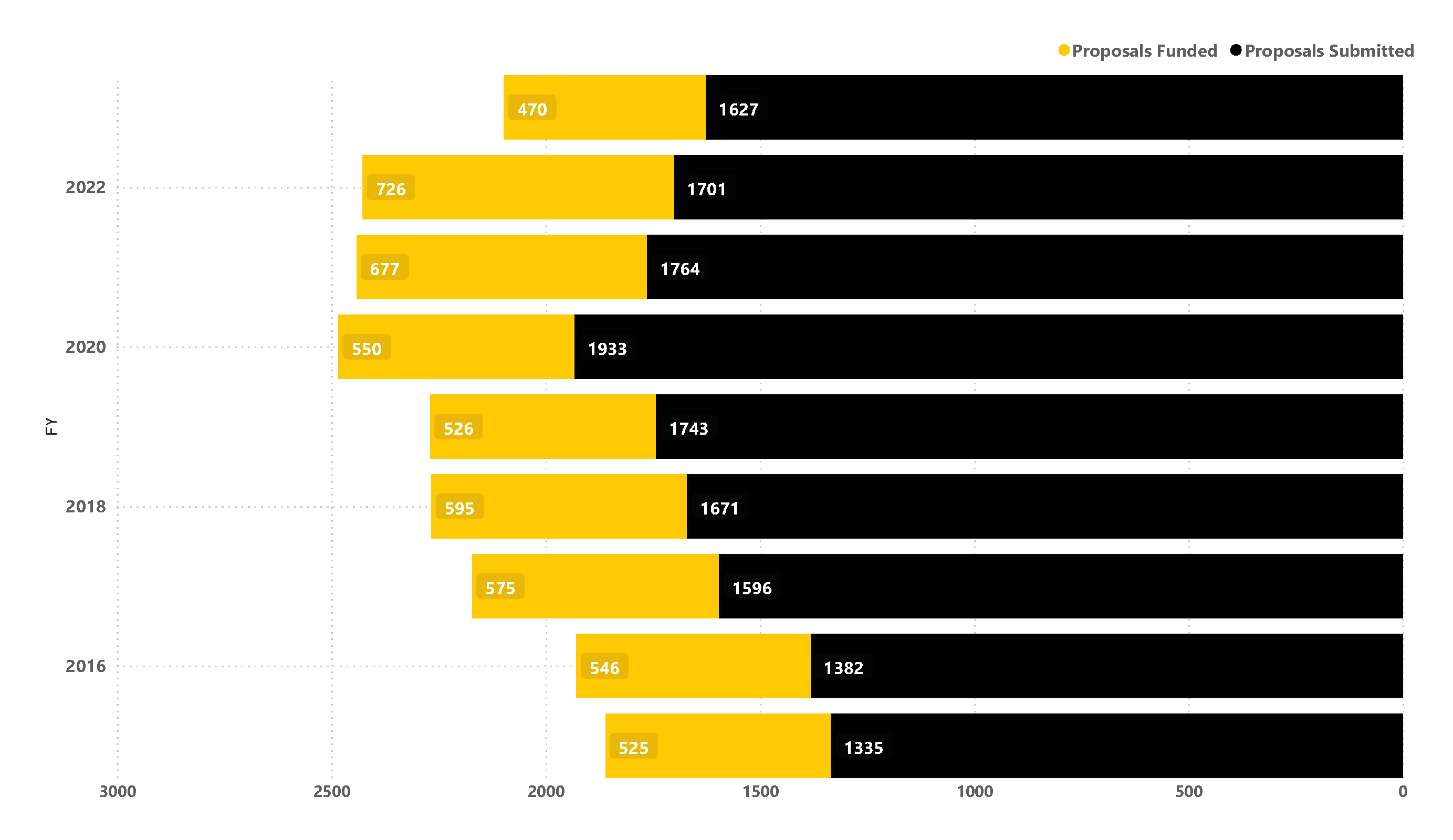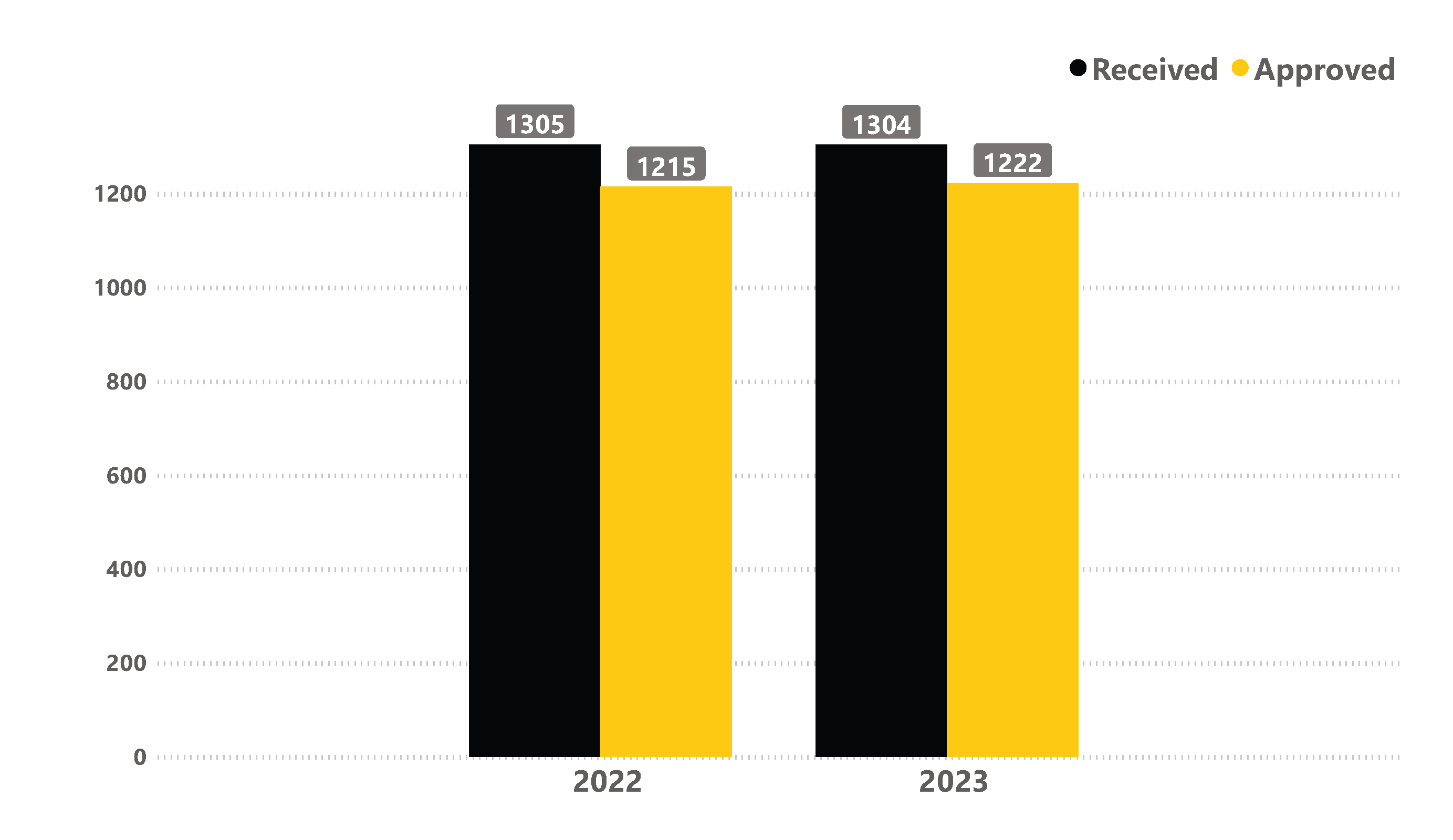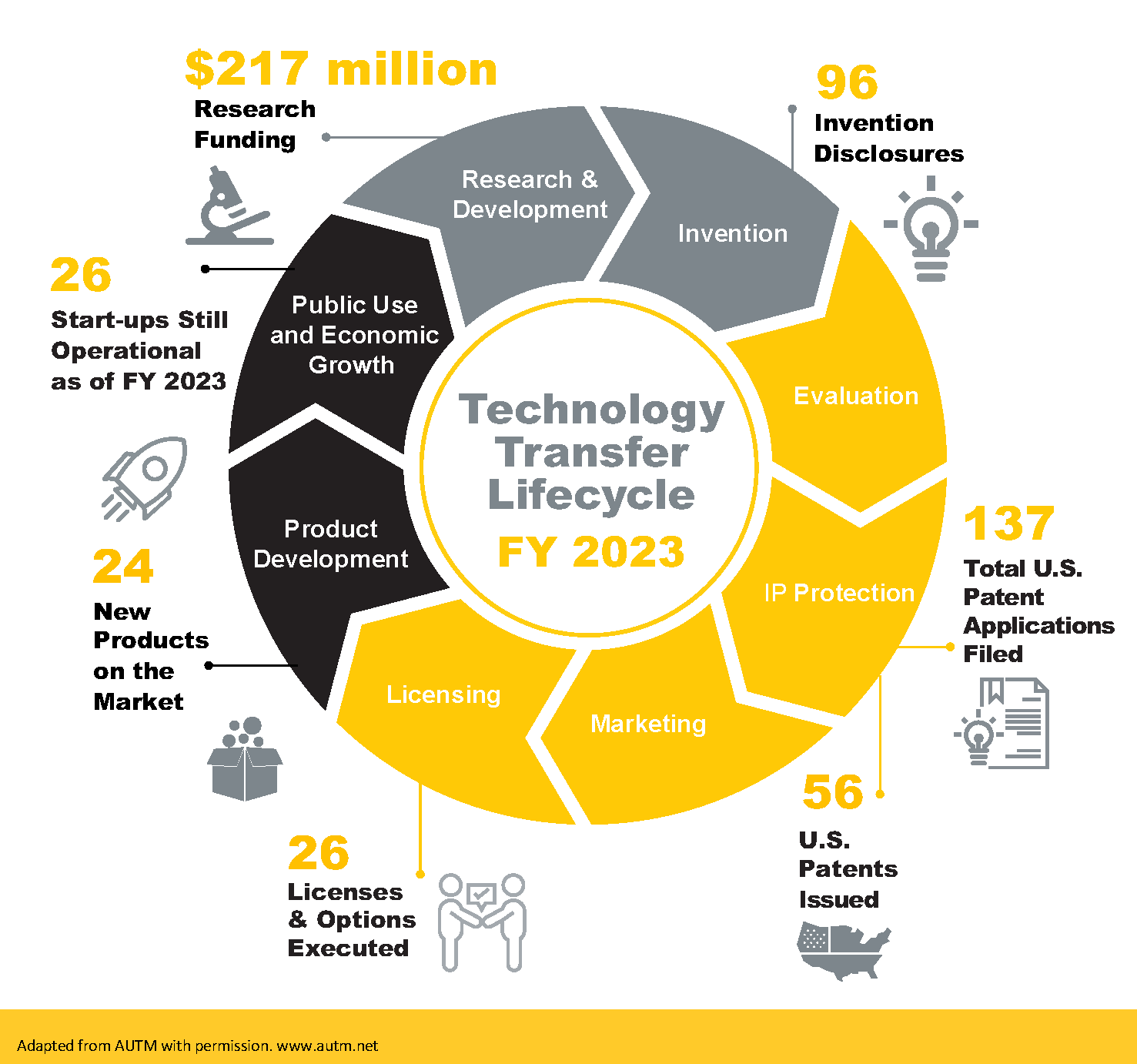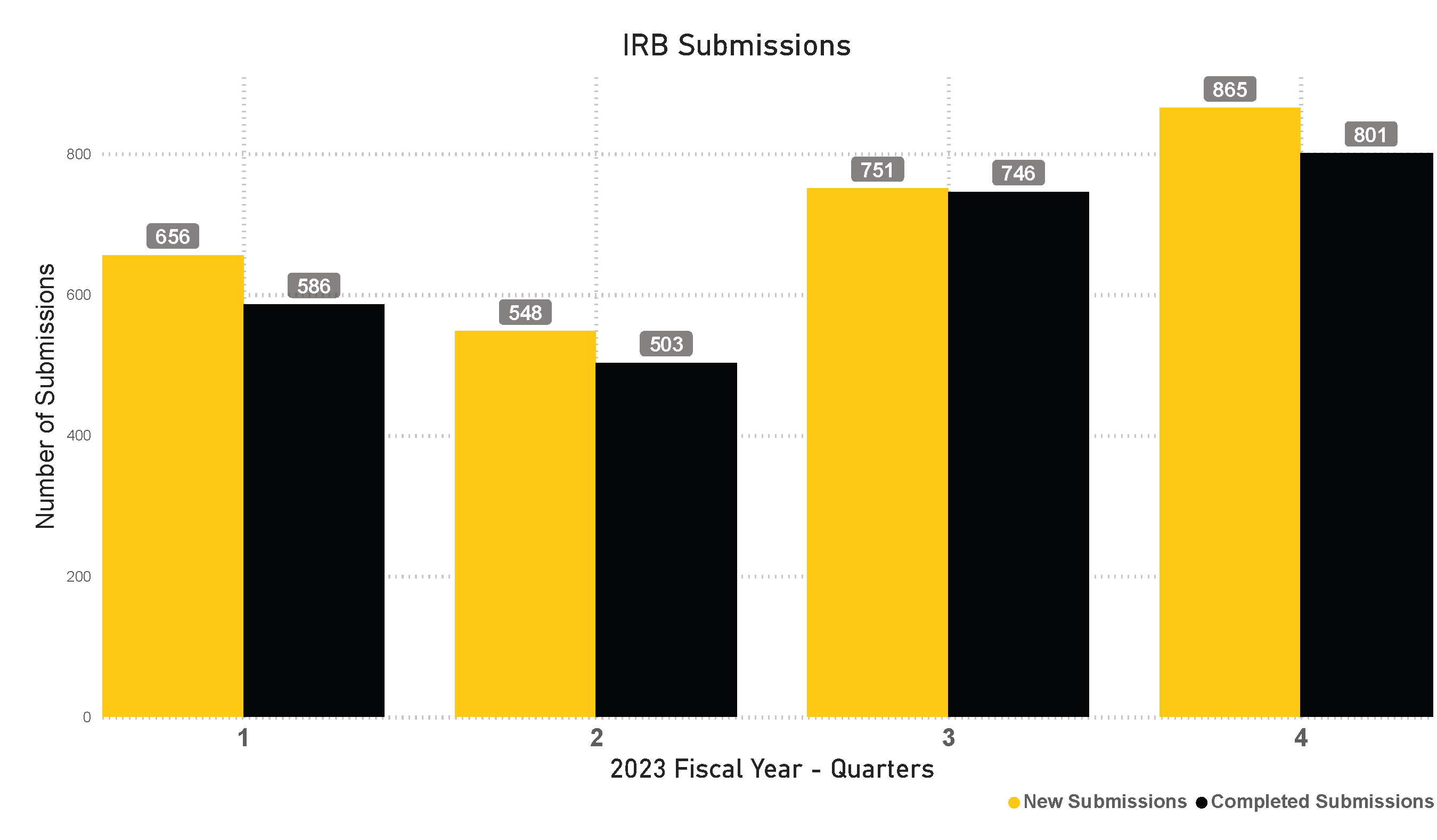Office of Research Units
Key to the success of UCF’s research enterprise are the research units supporting faculty as they work on large proposal submissions, navigate the research lifecycle, enter contractual agreements, comply with policy, perform animal or human subject research, have unique computing needs, collaborate internationally, communicate their findings and commercialize technology
Research Development
The Research Development team helps researchers identify potential funding and prepare competitive proposals. They conduct informational workshops, provide proposal development support, assist with funding searches, and coordinate limited submissions and internal programs.
POPULAR WORKSHOPS
Top workshops included a four-part DoD series, two “UCF Collaborates” events that fostered teaming and idea exchange across disciplines, and an NSF research outreach visit to UCF. The UCF Collaborates events were based on interest in the broad topics of Health (Fall 2022) and Digital Arts and Entertainment (2023). The NSF research outreach visit was done in conjunction with the UCF Urban Resilience Initiative.
EARLIER
Their EARLIER initiative is a comprehensive approach to large, interdisciplinary, and complex proposal submissions with a significant university-wide impact.
More than $7.8M of new research funding to support research teams was secured through through the initiative, which was launched this year.
Total Participants
Workshops in FY 2023
Proposals
The Office of Research assists grant development and submission efforts and helps verify the accuracy, validity, conformity, and eligibility of all proposals submitted to a sponsor on behalf of UCF.

Contracts
The dedicated Contracts Office team handles contracts related to research activities, serving a crucial role in facilitating and managing the contractual aspects of research-related agreements.

Office of Compliance
As UCF innovated and updated its enterprise management to the Workday system, the Office of Research’s Compliance Office identified a need to review and renew the Employee Compensation Compliance (ECC) system and the associated Time and Effort Certification Policy. For research institutions, it is critical to mitigate the institutional risks associated with
noncompliant documentation of personnel costs. Per (2CFR), § 200.430, UCF is required to have a system in place for certifying the allocation of time and effort associated with sponsored research, training, and service awards.
With the latest updates to the ECC system and the university’s Time and Effort Policy, UCF can more effectively manage time and effort certification and payroll confirmation. To meet this goal, the Time and Effort Certification Policy was updated with
these points of emphasis:
- Having a certification system in place that reflects new changes in association with the
Workday transition. - Emphasis on direct charging time and effort to sponsored awards.
- Emphasis on time and effort allocated to sponsored awards cost shared by the
university to be properly accounted for by charging a cost share grant. - A new Compensation Reporting course, which provides an overview of the federal
requirements of time and effort reporting (CITI Program).
With the changes outlined above, it is the Compliance Office’s goal to continue to meet federal, university, and sponsored award policies and regulations.
Graduate Research Information Technology
UCF Graduate and Research Information Technology (GRIT) supports technological needs related to graduate studies and research including data management, software, training and
support, cybersecuirty, research computing and collaboration tools.
Total Workshops
since January 2021
Unique Workshop Participants
since January 2021
Researchers Supported between
January 2022- March 2023
Hours of Facilitation between
January 2022- March 2023
MOST POPULAR WORKSHOPS
- AWS Streaming Analytics Workshop
- Amazon Braket for Quantum Computing Research – Introduction
- High Performance Computing using Newton and Stokes

Tech Transfer Lifecycle
Our Office of Technology Transfer brings discoveries to the marketplace through intellectual property protection, marketing, and licensing processes and it connects UCF researchers with companies and entrepreneurs to transform innovative ideas into successful products.
Marketing and Communications
UCF Office of Research Marketing and Communications plays a pivotal role in disseminating the findings, advancements, and initiatives of the university’s research endeavors to various audiences. Their work involves public relations, media relations, content creation, internal communication, collaboration and networking, events and workshops, grant and proposal support and website management.
MAJOR MEDIA EARNED COVERAGE
Forbes
Wired
Popular Science
National Public Radio
MOST POPULAR NEWS STORIES
Butterflies Inspire Paint Without Pigments
Outlet reach: 72M unique visitors/month
Saltwater is a lithium-ion battery’s worst enemy. This aqueous prototype embraces it.
Outlet reach: 3M unique visitors/month
AI drug discoveries to cut costs and save lives: Medicine’s next big thing?
Outlet reach: 10M unique visitors/month
ADVERTISING VALUE EQUIVALENCY OF EARNED MEDIA: $219.4 Million

institutional review board
Our Institutional Review Board (IRB) is responsible for overseeing research involving human subjects to ensure that it meets ethical and regulatory standards. IRB reviews research proposals to assess the potential risks to participants and ensures that the rights and welfare of human subjects are protected.
INTERNATIONAL COLLABORATION AND EXPORT CONTROL
The Office of International Collaboration and Export Control assists the UCF community with export control compliance and international partnerships while mitigating the risks
related to inappropriate foreign influence.
Visas obtained for foreign nationals seeking employment at UCF
Employees Assisted with the foreign influence screening process
International travel requests completed for faculty, staff, and students
Export control assessments completed
Research Foundation
The UCF Office of Research’s Research Foundation acts as a facilitator, ensuring that the funds
are used appropriately, ethically, and in accordance with the regulations and goals of the funding
agencies. They actively support the research enterprise, including by providing GAP funding.
The Gap Fund program’s purpose is to fund researchers whose projects focus on elevating the
readiness level of technologies they developed in order to attract licensing and partnering interest
from industry. This year, the Research Foundation Board of Directors approved funding to support
Dr. Antonis Zervos’s project titled Development of a High Throughput Screening Platform for the
Identification of Small Molecule Inhibitors of MUL1 E3 Ubiquitin Ligase. The goal of the project is to
develop a high throughput screening (HTS) assay to identify novel inhibitors of the protein MUL1
for treatment of obesity and metabolic diseases.


